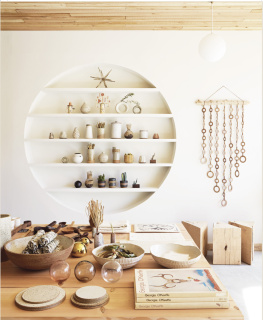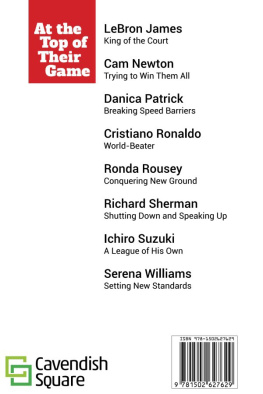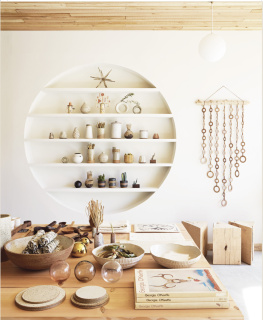Serena Mitnik-Miller - Abode: Thoughtful Living with Less
Here you can read online Serena Mitnik-Miller - Abode: Thoughtful Living with Less full text of the book (entire story) in english for free. Download pdf and epub, get meaning, cover and reviews about this ebook. year: 2019, genre: Home and family. Description of the work, (preface) as well as reviews are available. Best literature library LitArk.com created for fans of good reading and offers a wide selection of genres:
Romance novel
Science fiction
Adventure
Detective
Science
History
Home and family
Prose
Art
Politics
Computer
Non-fiction
Religion
Business
Children
Humor
Choose a favorite category and find really read worthwhile books. Enjoy immersion in the world of imagination, feel the emotions of the characters or learn something new for yourself, make an fascinating discovery.
- Book:Abode: Thoughtful Living with Less
- Author:
- Genre:
- Year:2019
- Rating:4 / 5
- Favourites:Add to favourites
- Your mark:
- 80
- 1
- 2
- 3
- 4
- 5
Abode: Thoughtful Living with Less: summary, description and annotation
We offer to read an annotation, description, summary or preface (depends on what the author of the book "Abode: Thoughtful Living with Less" wrote himself). If you haven't found the necessary information about the book — write in the comments, we will try to find it.
Abode: Thoughtful Living with Less — read online for free the complete book (whole text) full work
Below is the text of the book, divided by pages. System saving the place of the last page read, allows you to conveniently read the book "Abode: Thoughtful Living with Less" online for free, without having to search again every time where you left off. Put a bookmark, and you can go to the page where you finished reading at any time.
Font size:
Interval:
Bookmark:


Wed recently moved in together when we secured the lease for General Store in December 2009. We fell in love with redoing the space. It was our first foray into making a space that we had complete control over: our first ours. We came up with General Store because we wanted a succinct yet all-encompassing name that we could do anything with. We didnt even want a the in front of itdidnt seem necessary.
When we opened, we were very interested in supporting creativity in the community; we had all of these friendsreally amazing makers and artisans and craftspeople and woodworkerswho made one-of-a-kind things for us to sell.
In the beginning, the more well-known designers we were into were not willing to offer us terms, and we were broke, so our inventory was what we had in our home that we could part with. We emptied out our kitchen, living room, and closets to add to a mix of ceramic planters, tea sets, a midcentury sofa refurbished by our friend Josh Duthie of Chairtastic, baby sweaters from France, and leather feather earrings made by a local artist. From the start, people reacted with interest and excitement. We were really surprised that we made enough in the first month to pay our rent and order more inventory.
Month by month, as we introduced more stuff to sell, we became more thoughtful about why we were choosing each thing. Looking back, its clear that the success of the store had a lot to do with our being open to trying a variety of goods. We stocked the store the way we stocked our house: with new and vintage items and well-designed home goods. It emphasized a different way of livingwith plain, simple, well-made, beautiful things but not just one specific style.
Often when people came to the shop we would hear them say, I wish my home looked like this. And we realized that was a part of why they were interestedGeneral Store spoke to a simplified and directed design aesthetic that they were striving toward, though they didnt know it yet. Back then, you could go to bookstores with galleries, sure, but there wasnt a store that we would go into and think: This is my vibe; this is it!
At that time, finding a unique handmade ceramic meant driving through the woods of New Hampshire or some such similar journeyit was pretty much unheard-of. Then there was a big resurgence in small-scale handmade everythingcarefully curated craft fairs and new design magazines began to pop up. We went from ordering a box of things from Japan to sell, to driving up and down the coast, picking up ceramics, soap, candles, and custom small-scale furniture and design items directly from artists studiosand stopping for honey in Jalama along the way.
Over the years weve become more educated (which is easy, considering we went into this retail business knowing nothing). The store has this wide perspective with a very thoughtful curation, and it attracts people because of how its put together, with each piece given equal importancea vintage ceramic and a new hand-built mug, an Edwardian-era dress and a fresh-out-of-the-box pair of clogs, just-released coffee-table books and timeless classicsall presented against natural wood with bright whitewashed walls.
When we finally got to the point of owning our first houseafter renovating two locations of the store and living in several rented apartments togetherwe had years of pent-up desires for our living space, our longed-for abode. Of course, you can dream up endless scenarios, but you cant test them without something concrete: The process of rethinking our house, beginning by stripping it all the way back, crystallized our design beliefs and point of view. After sharing the renovation of our Topanga home on Instagram and seeing that people were interested in the details of what we were doing and why, we realized that vision was resonating.
At home and in the store, it has become about more than owning and appreciating one-of-a-kind handmade goods; its about figuring out how to consciously incorporate them into your daily surroundings. It can start with your favorite ceramic coffee cup and spill into the rest of your life too.
We dont pretend to have all of the answers. But we do think about it. A lot. This book represents the sum of all that thinking, whittled down to the doing. We hope it inspires you.


VISION

Our Topanga house, from initial impressionnote the unpainted fireplace, the linoleum floor, the red beamsto the early stages of being stripped back, when we first saw the open space and recognized its full potential
When we first stepped over the threshold of our Topanga home, it was so dark and masculine-feeling, it was like entering a cavea cave with kelly-green laminate counters, ceiling joists painted cherry red, and a kitchen with two contrasting patterns of linoleum.
But so many other things called out to us: the exposed queen truss ceiling construction, the maple hardwood floors, the operable clerestory windows, the original doorknobs with a simple decorative pattern. Radiant light streamed into the enclosed sunporch in the back (inspiration to illuminate the rest of the house), and a giant century plant thrived outsideone of those agaves that only sends up a stalk every decade or so, toward the end of its life span. It was so real, this imperfect hundred-year-old, cabin-like house. And it had been largely untouched, waiting for us.
Honoring a structures history and channeling its purest form lie at the heart of our design aesthetic. We knew just by looking at each other that we belonged here. We were in.
Over the years weve learned to seek out and value these marks of craftsmanship and originality, because weve had a lot of experience with stripping spaces back and building them up. When considered together, our tiny first apartment in San Francisco and our L.A. and S.F. stores checked every must go box: from dropped ceilings and nonsensical tiny rooms to moldy carpet and linoleum tiles adhered to black asbestos mastic. And then there are Masons residential projects, spanning sensitive midcentury restorations to Craftsman bungalows and Tudor-style houses with modern additions.
These spaces are all inherently different, with singular purposes. But our approach has been roughly the same: Bring the site back to its essence, and incorporate only the things that are intrinsic to a successful space.
For us, the process usually starts with dreaming. We begin by brainstorming all the possibilities, and little by little we come back to reality, weighing what we can do logistically and what our budget will allow as we formulate a strategy. Learning to see potential is half of the challenge; making thoughtful choices after youve uncovered that potential is the other.
The open plan is an idea that were always attracted to, but the degree to which open planning manifests is flexible. We understand that not everyone has the ability to knock down walls and move them around. People are limited by rental agreements, budgets, building codes, and circumstance.
Next pageFont size:
Interval:
Bookmark:
Similar books «Abode: Thoughtful Living with Less»
Look at similar books to Abode: Thoughtful Living with Less. We have selected literature similar in name and meaning in the hope of providing readers with more options to find new, interesting, not yet read works.
Discussion, reviews of the book Abode: Thoughtful Living with Less and just readers' own opinions. Leave your comments, write what you think about the work, its meaning or the main characters. Specify what exactly you liked and what you didn't like, and why you think so.










